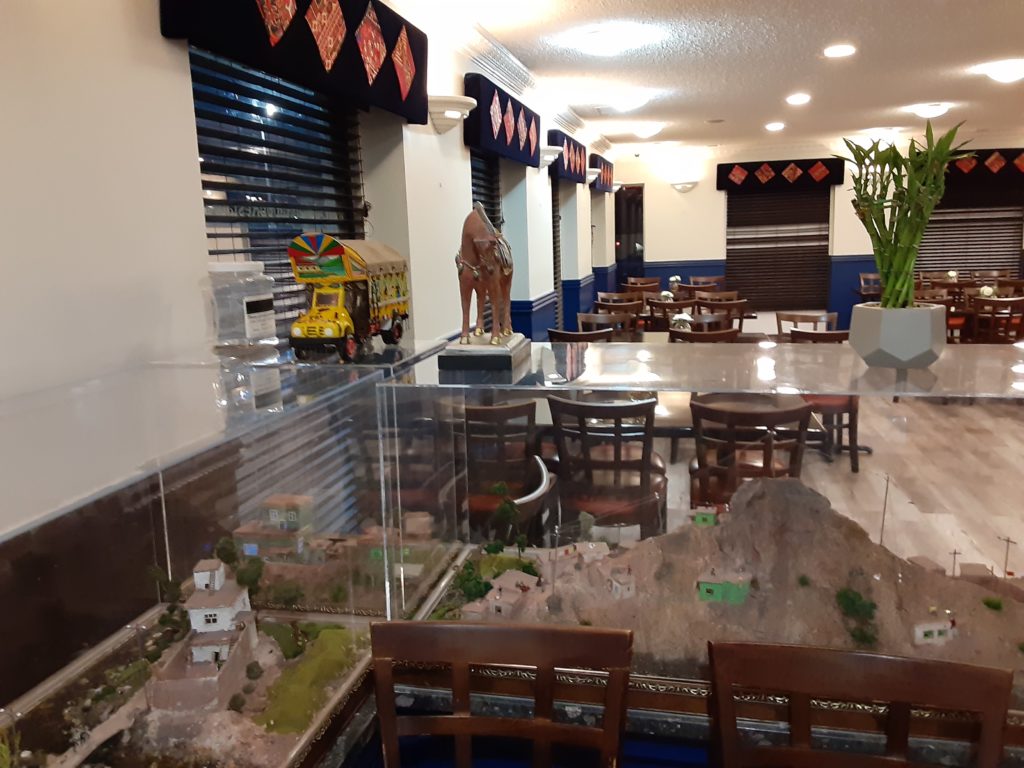
It didn’t seem right for me to fake travel to Afghanistan earlier in my project, given the political upheaval and regime change. But there are so many great Afghan restaurants in my area, I decided it made sense to support one of them. There was also a film I wanted to watch and author whose works I wanted to read. So, in March, off to Afghanistan from home I went!
My Choices
Meals: Afghan Kabab is a restaurant near me I’ve driven by thousands of times and never before visited. So for this fake trip, I finally ventured inside for takeout. Though I couldn’t find any kababs on their menu that were vegetarian, they do have a vegetarian section of their menu. So I had a number of good choices from which to pick and ended up getting the “Vegetarian Dish,” a platter of bouranee baunjan (fried eggplant), subzi (sautéed spinach), and kadu (sautéed pumpkin). I admit it wasn’t gorgeous in a takeout container, but the dish was amazingly delicious. It was served with the biggest piece of nan (Afghan bread) I’ve ever seen; I didn’t even have a plate large enough to hold it! There was definitely enough to last me two full meals.
One of the best parts of the restaurant was this amazing model of an Afghan Village by Sala Muslim. It was displayed in multiple display cabinets by the entrance of the restaurant, and I took a while to look at all the incredible details before heading back home with my food. The restaurant wasn’t busy (though others came in to get takeout when I was there), so I was able to linger and take some photos.
Dessert:Â Nearly all of the desserts listed on Afghan Kabab’s menu contained pistachios, so I was all prepared for that taste. But when I called to order, the dessert they had available was jelebee (Afghan funnel cake). I have never imagined something so simple and decadent. Each bite came with warm, wet honey that practically melted on my tongue.
Music:Â I went a little different for this trip and ended up reading about the history of music in Afghanistan. I knew that most non-religious creative expression had been banned by the Taliban, but I don’t think I’d understood the extent of that. Not only were instruments destroyed, but music and dancing was even banned from weddings. Music wasn’t able to progress again until November 2001 when the Taliban regime fell. There was a rebirth of music, with musicians returning to the country and music returning to the airwaves. But now that the Taliban have taken over again, much of Afghanistan has gone silent. Musicians are scared to perform or fleeing because of the ban on playing music in public. The Afghanistan National Institute of Music was turned into a military base. And at least one folk singer has been publicly executed.
Movie: There was a movie that popped onto my radar last year about an arts community in Afghanistan. But I couldn’t find it again when I tried to located it on streaming services. I hope one day I’ll run into it again. I ended up watching Three Songs for Benazir, a 2022Â Oscar Nominee in the category of Best Documentary Short Subject. It was an intimate look at one displaced man in a Kabul camp trying to build a life for him, his wife, and his child. He has few options, none of them ideal. But he has love, drive, and optimism, which are incredible.
Books:Â A friend of mine discovered author Nadia Hashimi through her book group, and has been raving about her books for several years now. She’s a local author who writes about Afghan Americans and Afghans in Afghanistan. I have been wanting to read one of her books for a while now, and this fake trip was a wonderful excuse to read one… or two!
I read One Half from the East, which was a great story about the cross sections of gender and culture. It’s about a young girl from a family of girls who becomes a bacha posh—a preteen girl dressed as a boy. Her father is injured and unable to provide for the family or even walk, and she is able to help her family as a boy the way she couldn’t as a girl. But her time as a boy is limited, as she ages and her body starts to change. I loved the book and really want to read the book that has an overlap with this one, The Pearl That Broke Its Shell.
I also read Sparks like Stars, which starts in Kabul, 1978. Sitara is ten years old when she escapes a coup. She is smuggled out of the country at great risk. Her life saved, she her life starts over in America, though the grief of losing her country and not knowing for certain what happened to her family haunts her. In 2008, she gets her first lead to possible answers about what happened and decides to head back to Afghanistan to follow it. This book was full of emotion and hope despite desperate circumstances.




